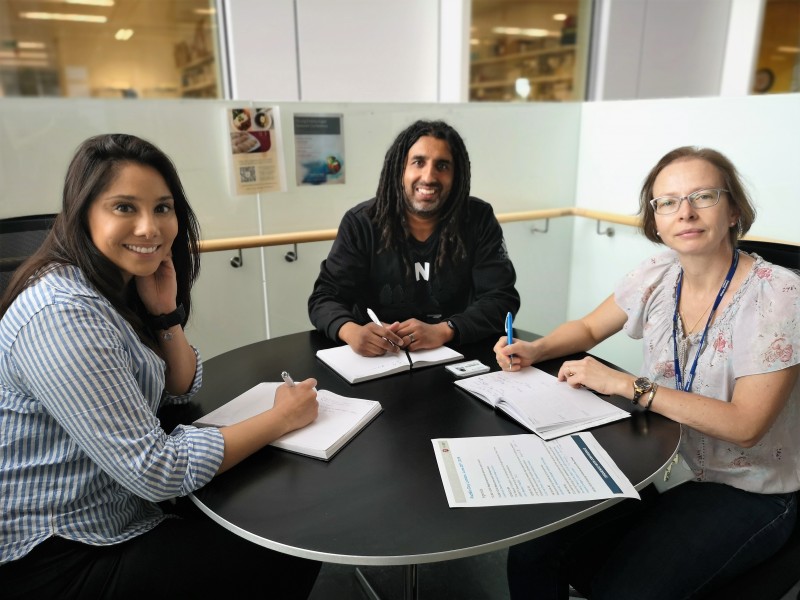By Sophie Arthur
February 28, 2020
Time to read: 5 minutes
One of our technicians, Ivan Andrew, recently completed his professional registration with the Science Council. We sat down with him to discuss what this meant now and in the future and why you should think about getting yours too.

What is your job role at the LMS?
I’m a Research Assistant-Lab Manager for the Genomics Core Lab run by Dr Laurence Game. I have been with the Core Lab for a very long time, starting back in 2004 when I came to the UK from New Zealand on a 2 year working-holiday visa.
I work as part of a team of 3 who provide a variety of Genomic Services (primarily Next Generation Sequencing) for the LMS and Imperial College. My role allows me to interact with a number of scientists throughout the Institute which I enjoy thoroughly even though it can be very challenging at times.
How did you get into your technician role?
After I graduated from Auckland University back in 2001, I was unsure whether to push on with more study as I was really keen to start earning money.
A friend of mine told me of a role in the Sanger Sequencing department in Genesis Research of Development which was one of the largest Biotech companies in New Zealand at the time. I was successful in getting the job and really enjoyed the fast pace of the lab and the reliance that other people had on the sequencing data we were producing to further progress their research.
It was actually a colleague from that Sanger Sequencing department back in New Zealand, who was doing a PhD at Imperial College who introduced me to Dr Mick Jones back in 2004 when there was a role available in the Genomics Facility.
What is professional registration and what does that mean for you now?
Professional registration with the Science Council provides an independent recognition that I am working to a certain standard in my current role. It is about acknowledging skills, not just qualifications, and is an opportunity for technical staff to be recognised for their expertise and their contribution to the science being performed within their Institute.
I don’t think it will have a major impact on my job in particular, but for technical staff in general, who have historically always been given very little credit for the work they do, I think it will definitely give them a sense of pride, and maybe even some form of recognition, such as being acknowledged on papers, within their Institute. It gives them a chance to prove their experience and competence in a tangible way.
Why did you apply for it?
I first heard about Professional Registration in October 2016 at a workshop at MRC Harwell which was focused on technical staff. At the event, about 6 MRC Harwell technicians were being presented with their Professional Registration certificates. It was really refreshing to see how proud the technicians were of their achievements and also how enthusiastic senior management were to get their staff registered that I came away from it thinking that it is something that we needed at the LMS.
In January 2017, I worked with HR to produce the Support Staff survey to try and identify any possible shortcomings in the professional development of LMS technical and support staff, and from there joined the Athena Swan Development Working Group.
As far as I knew, no-one from the LMS had been professionally registered through the Science Council, so I wanted to give it a shot to a) see what it involved, and b) see what other doors it might open up for me.
How do you get a professional registration?
There is a ton of information on the Science Council website about getting professionally registered through them. The main decisions you need make are around which professional award is right for you? After 19 years of experience as a technician, I felt confident of going for the top award and managed to achieve it, but there are various awards that recognise the varying levels of acquired skills and expertise. You need to consider which professional body you wish to join as part of your Professional Registration. I chose The Royal Society of Biology and now receive monthly newsletters about upcoming events, possible professional development opportunities, and just general information about issues and advancements in the wider bioscience community. You also can consider whether you want to do a written or verbal registration.
What are the next steps for you?
Part of my Professional Registration ‘contract’ is to ensure that I carry on with my CPD (Continued Professional Development). I will need to keep an accurate record of all courses, workshops, trainings that I undergo in case this is requested. On a more personal level, I am more than happy to help anyone through the registration process.
The LMS has recently signed The Technicians Commitment which is a pledge to support and develop their technical staff so you should receive the full support of your line manager to try and achieve your Professional Registration. To add to that, the MRC has also received funding to financially support anyone who wishes to get registered.
Do you have any advice for anyone else thinking of getting professionally registered?
My advice for anyone thinking of doing this is to come and have an open and an honest chat to me about exactly what is involved in the process and how much time and energy it takes. It is by no means an easy process, but this adds to the sense of accomplishment once you achieve it.